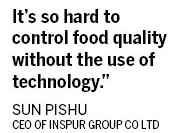 |
|
|
|
|||||||||||
Buyers will be able to find out relevant product information
When customers throughout China buy food in the near future, they will be able to know immediately where it comes from, what company made it and even how it was produced.
That's according to Sun Pishu, CEO of the Chinese information-technology company Inspur Group Co Ltd and a member of the Chinese People's Political Consultative Conference National Committee.
Sun said China may have a national electronic food-safety tracking system in place by the end of the 12th Five-Year Plan period (2011-15), helping make food safer and market regulation easier.
According to a previous China Daily report, a poll on the official website of the CPPCC Beijing Committee suggested that food safety holds seventh place on a list of 15 matters that are of major concerns to Chinese Internet users. Sun said: "It's so hard to control food quality without the use of technology. Without food-tracking technology, we will hardly be able even to monitor a piece of pork."
|
|
 |
 |
The planned food-tracking system will use Radio Frequency Identification, wireless technology that can be used to check the identity of almost everything and make counterfeiting difficult. The system will bring about several changes in the food industry. When food is produced, it will be given a bar code that will follow it until it is purchased by a customer.
That customer can then discover various information about the product - including its place of origin, producer, date and seller - using a bar-code reader, Sun said.
The company said it has already worked with local governments to test food-tracking systems in Shandong and Shanxi provinces. Sun said the tracking systems in those places can only be used to track a few types of foods.
In Jinan city, Shandong province, the Municipal Bureau of Commerce has established a system for tracking pork, and the bureau uses a bar-code reader to track meat in more than 80 stores. "We carried a survey showing that after customers were able to track food, the food began selling better than before," Sun said.
Because of the prevalence of small farmers and food producers in China, it will take time to establish the system throughout the country, Sun said.
Li Rong, a member of the CPPCC Beijing Committee and expert from the Office for Public Health Management under the Chinese Center for Disease Control and Prevention, said the country is home to more than 200 million farmers producing raw agricultural products, and about 90 percent of the country's 400,000 food-processing companies are small or medium-sized.
Gu Jiuru, another member of the CPPCC Beijing Committee, who is also the executive chef from Beijing's Quanjude, a well-known roast duck restaurant chain, said in a previous report that the city should work to establish a food-safety system sooner and to ensure that the food supply can be monitored.
Gu said the ducks in his restaurants are sold with a traceable ID and the company sells about 9 million a year.
tuoyannan@chinadaily.com.cn